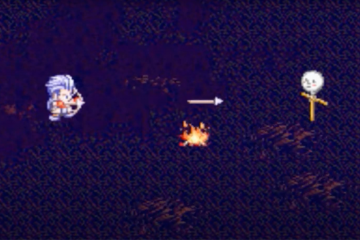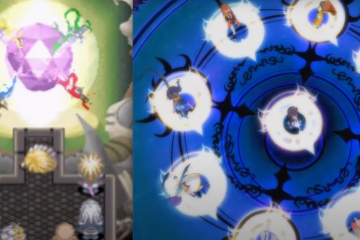
Ladies and gentlemen, it is my pleasure to introduce you all to Now Loading…The Video Game Canon! In this weekly column, we will be taking a closer look at video games that we believe either deserve to be historically canonized in the world of art, or else be forgotten to the wastes of time. After countless discussions with my good friend Aaron about the nature of video games as art, we decided that we would take it upon ourselves to construct a video game canon in the style of the western canon of literature. It is a forgone conclusion in the literary world that the works of Shakespeare, Hemingway, Aristotle and the like are the backbone of Western literature, and that it is important to have read and understood these and other works to have a base understanding of literature as a whole. Similarly, we at With a Terrible Fate believe that the works of certain video game developers should be held in the same esteem. Would you discuss role-playing games without referencing the Final Fantasy or Ultima series? What about trying to understand platformers without first having a base knowledge of Super Mario Brothers? When it comes to gaining a deeper understanding of video games as a medium, it is important to know not only what has come before, but also the impact these games had on gaming in general.
A “canon,” when it comes to philosophy, literature, and religious study, is a collection of work that exemplifies and in many respects gives context for the medium it represents. For example, the canon of western philosophy is a collection of thoughts, ideas, and work that has been built upon for centuries and centuries. One cannot hope to understand modern philosophy without looking to the philosophers of the past, specifically the ones considered to be seminal. Likewise, when it comes to literature and religious study, a canon is a group of agreed-upon works from the past that inform those media in the present. One gains a deeper understanding of something like the works of Stephen King if one has a basic knowledge of H.P. Lovecraft and Edgar Allan Poe. Likewise, the New Testament becomes a richer, more interesting text when the Old Testament and other Judaic precursors are in one’s referential repertoire. A canon, therefore, is an incredibly useful tool for not only referencing important works from the past, but also understanding the modern impact of things that came before.
When it comes to understanding and analyzing different art forms in any meaningful way, a canon is an incredibly useful tool to have at one’s disposal. Philosophy, literature, religious study, art, cinema, and music all draw upon well-established and respected canons to inform newer entries into the medium We here at With a Terrible Fate see no reason why video games should be considered any differently. Video games, even in the relatively short while they have been around, have developed such a rich and detailed history, with so many different interesting stories, that there needs to be a canon to capture the medium’s cultural and artistic impact. In this series, we will be analyzing games as potential candidates for the video game canon in the hopes that we can establish an encyclopedic reference guide to the medium as a whole.
The entries in this series will be structured in a very simple, collegiate essay style:
- We’ll start with an introduction describing the history and development of the game
- We’ll look at the story and characters
- We’ll explore the gameplay, music, and visuals
- We’ll discuss the impact it has had on gaming and culture in general
- There will also be a section that I am cleverly titling “BONUS LEVEL,” in which we take a deeper look at a scene, piece of music, or moment that is worthy of mentioning even if the game is not worthy of being added to the canon. This way, even if the ultimate decision is to let the game fall victim to the ravages of time, it will still be given any credit that is due to it for an outstanding moment.
- And, of course, I’ll render the VERDICT on whether or not the game is worthy of entering those hallowed canonical halls we are trying to build.
By briefly examining all these different aspects of the game, we will be able to come to a verdict and establish an interesting and meaningful canon for the video game medium.
Now, if you are anything like me—and, being a reader of With a Terrible Fate, I should think that you are—you may be thinking that these essays may run the risk of being too much like an Internet review of a video game. It is not my intention with this series to simply name a video game and give my reactionary opinion on whether or not I think it is good. However, video games are by their nature an interactive medium, which means that a player’s personal opinion and experience are crucial when it comes to the analysis of that game. It is my intention to fuse objectivity about the game’s history and mechanics with my own personal experience, such that the analysis and decision on whether or not it should be canonized accurately reflects the medium I am representing. Video games as a medium are so dependent on player input that to omit that would be, in my humble opinion, to betray what video games as an art form are attempting to do in the first place. That being said, I will be avoiding strictly reactionary opinions in this series in order to distance myself from the domain of online video game reviews.
This series, as we see it, is a representation of the important intermediary step between initial reactions and deep analysis of video games that you have come to expect from With a Terrible Fate. Each and every article on this website is the result of countless hours of play, research, and writing, but they all started with a reaction to a game, and the experience that we had while playing them. Consider the installments of Now Loading as the in-between step that we go through after playing a video game and before writing the in-depth analysis of a particular aspect of that game. First we play the game and discuss it with each other; then we contextualize the game and gain an understanding of what it offers, before finally diving into a specific aspect or theme that it offers. In essence, we are constantly thinking about video games in relationship to one another and considering how a new game is affected by those that came before it; in this series, we are attempting to cement those points of reference that we use for our articles. With the creation of this canon, it is our hope that we will offer you an encyclopedic collection of references to use for your own articles and insights on video games. Consider the canon, if you will, as a SparkNotes for video game analysis. Only, you know, a little funnier at times.
Lastly, dear reader, I will reiterate that this series will be heavily influenced by opinion and experience, and, as such, you may not always agree with the decision to allow or omit a video game into our canon. This is a wonderful thing, and we encourage you to open a dialogue with us about the decisions we make. Do you agree with us, do you think a different aspect of a game should be analyzed for the canon? Please, let us know! It is our sincere hope that this will be an interactive series because, after all, it’s not solely up to one person to determine the canon. Think of this series as a collaborative effort between the writers and readers of With a Terrible Fate!
In conclusion, this is an idea that we have been mulling over for quite some time. We find it incredibly important that, as video games continue to be considered a legitimate art form, we put together a canonical list of video games that represent the best aspects of the medium. Thank you for reading, and we look forward to embarking on this journey with you to establish the definitive, encyclopedic canon of video game storytelling!



